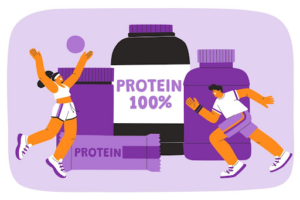There are some physical demands that athletes competing in different sports must endure. Proper nutrition will help prevent your energy levels from being out of whack, help you build and maintain endurance, and support good recovery. Fuel for peak performance and help prevent fatigue and injury is the right fuel. The transition from court to field or back-to-back training sessions can be a challenge, but a strategic approach to nutrition means your body is ready to take on what’s next.
Balancing Macronutrients for Sustained Energy
Playing so many sports depletes your energy reserves like nothing else. So, you need a perfect balance of carbs, proteins, and fats to keep going. Carbohydrates provide quick fuel and are used to power sprints and sudden bursts of action. Proteins help rebuild muscle tissue, helping you recover stronger after intense sessions. Healthy fats are your long-term energy reserve.
Timing matters, too. Eating carbs before and after to get energized and protein + carbs afterward to build. Fiber helps keep you stable all day long. Balanced macronutrients help you sidestep the highs and lows. It’s not about eating. It’s about eating smart. Furthermore, it also matters to your performance. Tools such as Melbet provide insights and resources that help players optimize their game strategies and entire performance routine. The more you know about these, the more interesting it becomes to follow and support your team.
Importance of Hydration in Multi-Sport Performance
Water is life, especially for athletes. Hydration is the backbone when juggling multiple sports. Dehydration slows you down and increases your risk of injury. Key hydration tips:
- Drink before thirst hits: The hydration begins before the game.
- Include electrolytes: Ensure your energy levels and muscle function during intense activity by increasing lost sodium and potassium.
- Monitor urine color: If it’s light yellow, you’re on track, and it’s a good way to check your daily hydration status.
They shouldn’t only drink water; during extended play, consider sports drinks. They replace vital nutrients, keeping you sharp.
Tailoring Pre- and Post-Game Meals
Meals are fuel, and your body is a machine. What you eat before and after a game helps elevate or hold back your performance. Pre-game meals have an emphasis on energy, and post-game meals are a focus on recovery. Pages such as Melbet Pakistan can help fans see and know how professional athletes manage their nutrition to improve their performance. The timing, balance, and type of food you eat depend. We will see both strategies.
Pre-Game Meals for Energy
Before the game, you need the energy-packed nutrients to keep going. They’re your go-to carbs fueling fast movements and explosive plays. Instead, choose easily digestible food sources such as oatmeal, bananas, or rice. Pair them with protein, such as eggs or yogurt, to keep you going longer.
Timing is key. Don’t eat two to three hours before the event, as you could get sluggish. Weigh portions, but focus on foods your body does well. Don’t eat heavy foods that will make you feel too heavy. So plan your pre-game meals well and be unstoppable.
Post-Game Nutrition for Recovery
Recovery starts immediately after the game. Glycogen stores are low, muscles are tired, and the body screams for nutrients to rebuild and recharge. The real focus here is protein, which repairs muscle fibers and aids recovery. Eat it with carbohydrates to restore energy stores.
Grilled chicken with sweet potatoes or a protein shake with fruit are quick options. Timing is key again, so refuel within 30 minutes after the game. This window maximizes nutrient absorption. Recovery isn’t about resting; it’s about eating the right foods to be stronger than before the next challenge.
Managing Nutrition During Tournament Days
On tournament days, use your body up. Your nutrition must be on point because you play long hours, back-to-back games, and high-intensity performance. Start the day with a balanced breakfast rich in carbs and protein: whole grain toast with eggs or a bowl of oatmeal with fruit. It creates a mood for sustained energy.
Between matches, eat quick-digest snacks such as bananas, energy bars, or a handful of nuts. They keep your energy steady without overloading your stomach. Sip water as often as possible and add electrolytes if you’re sweating. Planning properly keeps your body fueled, your mind sharp, and your performance unstoppable all day.
Supplements and Their Role in Multi-Sport Nutrition
Supplements are there when food isn’t enough. Protein powders help muscle recovery, and electrolyte mixes replace lost nutrients during intense sessions. Multivitamins fill in essential micronutrients, and omega 3s support joint health. However, supplements can be part of your nutrition game when used wisely. They must always be paired with a well-rounded diet for optimal results.
Peak performance for multi-sport athletes is founded on nutrition. The key is to balance macronutrients, stay hydrated, and adjust pre- and post-game meals, unlocking your full potential. Apply it to combine preparation tools and resources to better your game.

